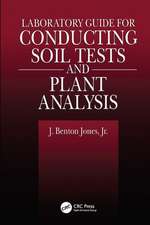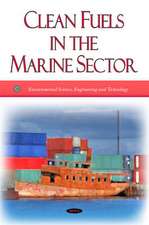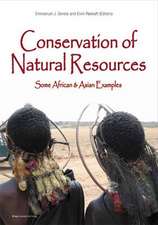Climate Change and Crop Production: Foundations for Agroecosystem Resilience: Advances in Agroecology
Editat de Noureddine Benkebliaen Limba Engleză Paperback – 25 feb 2020
| Toate formatele și edițiile | Preț | Express |
|---|---|---|
| Paperback (1) | 473.71 lei 3-5 săpt. | +20.85 lei 4-10 zile |
| CRC Press – 25 feb 2020 | 473.71 lei 3-5 săpt. | +20.85 lei 4-10 zile |
| Hardback (1) | 1168.85 lei 6-8 săpt. | |
| CRC Press – 27 dec 2018 | 1168.85 lei 6-8 săpt. |
Din seria Advances in Agroecology
- 9%
 Preț: 1214.91 lei
Preț: 1214.91 lei - 9%
 Preț: 593.74 lei
Preț: 593.74 lei - 9%
 Preț: 601.86 lei
Preț: 601.86 lei -
 Preț: 362.74 lei
Preț: 362.74 lei - 14%
 Preț: 338.33 lei
Preț: 338.33 lei -
 Preț: 464.81 lei
Preț: 464.81 lei - 13%
 Preț: 338.33 lei
Preț: 338.33 lei -
 Preț: 430.37 lei
Preț: 430.37 lei -
 Preț: 475.88 lei
Preț: 475.88 lei - 8%
 Preț: 389.59 lei
Preț: 389.59 lei - 18%
 Preț: 1341.51 lei
Preț: 1341.51 lei - 18%
 Preț: 796.59 lei
Preț: 796.59 lei - 18%
 Preț: 1015.82 lei
Preț: 1015.82 lei - 18%
 Preț: 790.20 lei
Preț: 790.20 lei - 18%
 Preț: 1000.27 lei
Preț: 1000.27 lei - 28%
 Preț: 739.24 lei
Preț: 739.24 lei - 29%
 Preț: 653.93 lei
Preț: 653.93 lei
Preț: 473.71 lei
Preț vechi: 514.90 lei
-8% Nou
Puncte Express: 711
Preț estimativ în valută:
90.64€ • 94.65$ • 74.85£
90.64€ • 94.65$ • 74.85£
Carte disponibilă
Livrare economică 25 martie-08 aprilie
Livrare express 08-14 martie pentru 30.84 lei
Preluare comenzi: 021 569.72.76
Specificații
ISBN-13: 9780367895921
ISBN-10: 0367895927
Pagini: 206
Dimensiuni: 170 x 241 x 15 mm
Greutate: 0.39 kg
Ediția:1
Editura: CRC Press
Colecția CRC Press
Seria Advances in Agroecology
ISBN-10: 0367895927
Pagini: 206
Dimensiuni: 170 x 241 x 15 mm
Greutate: 0.39 kg
Ediția:1
Editura: CRC Press
Colecția CRC Press
Seria Advances in Agroecology
Public țintă
Academic and Professional Practice & DevelopmentCuprins
Agroecology, Climate Change, and Agroecosystem Resilience. Physiological and Morphological Mechanisms Mediating Plant Tolerance to Osmotic Stress: Balancing Tolerance and Productivity. Response and Adaptation of Crops to Carbon Dioxide Rise: Coping or Dying. The Physiology and Phenology of Crop Production Under Temperate Climate Changes. Fitting Wheat Phenology to Maximize Yield in a Changing Climate. Response of Pulses to Climate Change: A Physiological Perspective. Climate Resilient Agriculture of Rice: A Physiological Perspective. Tropical Crops and Resilience to Climate Change. Grassland Resilience to Climate Change: From Species to Ecosystem. Effect of Topographic Properties on Crop Yield Variability and Farm Size in a Rural Farming Landscape: Opportunities for Engancing Resilience. Climatic Constraints in Tropical Forages and Common Beans: Suite of Plant Traits to Overcome Water Stress. Climate Change and Food Production Systems Sustainability. Mainstreaming Climate Change in Agricultural and Agroecology Education.
Descriere
This book presents an overview of agroecology within the framework of climate change. It covers elements of the changing climate and their impacts on crop production and agroecosystems, reporting on how plants will cope with these changes, and how we can mitigate these negative impacts to ensure food production for the growing population.

















